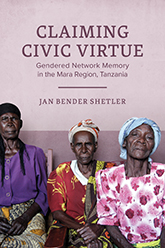|
Claiming Civic Virtue
Gendered Network Memory in the Mara Region, Tanzania
Jan Bender Shetler
Women in Africa and the Diaspora
“A major accomplishment. Shetler persistently approaches female-centered knowledge of the past as an alternative to male-centered forms. The result is a social history of patronage and rights networks in which female-curated knowledge is central. Guaranteed to be of wide interest among students of gender in history, anthropology, and East African studies.”
—David J. Schoenbrun, Northwestern University
Among communities in the Mara region of Tanzania, it is considered men’s responsibility to maintain “history.” But when Jan Bender Shetler’s questions turned to specific familial connections within the village, she discovered her male informants had to occasionally leave the room—to ask their wives for clarification.
The result is an original and wide-ranging investigation of the gendered nature of historical memory and its influence on the development of the region over the past 150 years. Shetler’s exploration of these oral traditions and histories opens exciting new vistas for understanding how women and men in this culture tell their stories and assert their roles as public intellectuals—with important implications for research in African and gender studies, and the history of ethnicity and nationalism.
Praise
“This important book offers a radical rethinking of honor and oral history in eastern Africa. While men engage in localized ethnic competition, women’s narratives weave together the larger region and serve as grounding for feminine civic virtue. This is a truly original work.”
—Steven Feierman, University of Pennsylvania
“An innovative and scrupulously researched reimagining of Tanzanian history through three generations of Mara women’s ‘network knowledge.’ Shetler’s deft treatment of female storytelling as an interethnic discourse of civic responsibility—a vital counterpoint to masculine ‘tribal’ narratives—breathes new life into the study of gender, memory, and identity in the African past.”
—Heidi Gengenbach, University of Massachusetts Boston
|

Larger images
July 2019
LC: 2018045780 HQ
352 pp. 6 x 9
7 b/w photos, 2 maps, 2 tables
|

